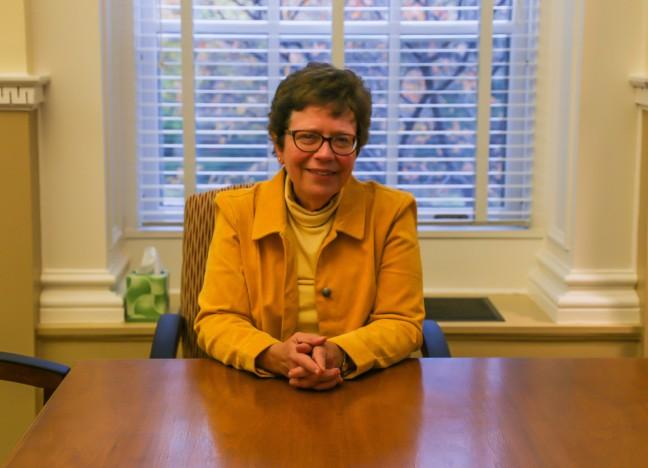During a campus budget forum held Wednesday evening at the Gordon Dining and Event Center, University of Wisconsin Chancellor Rebecca Blank asserted now is the time for the state to reinvest in higher education.
Blank provided an update to a room of about 100 students, staff, faculty and state legislators on the university’s current budget outlook, as well as the budget request proposed by the UW System.
While public universities outside of Wisconsin have started to see more state dollars since the recovery from the Great Recession, Blank pointed that the UW System has seen funding cuts five out of the last six state budgets. States that increased support for higher education between fiscal years 2014 and 2016 increased it at an average rate of 4.1 percent per year. Meanwhile, the UW System saw a decline of about 8.1 percent in state support, Blank said.
Now, Blank asserted, is the time to reinvest in Wisconsin’s higher education system to not only catch up to the state investment of other universities, but to get ahead. To make up the lost ground, she said, the UW System is not only looking to appeal to the Wisconsin Legislature but to engage and build up support across the state.
Noel Radomsky, Wisconsin Center for the Advancement of Postsecondary Education associate researcher and managing director, said the UW System president, the Board of Regents and the chancellors seem to be on the same page with investing in higher education.
Still, Radomsky noted, there is a major constraint to redirect state dollars to higher education. All aspects of the state budget are competing against the largest cost of Medicaid. With an aging population, Radomsky said, there is an inflating fixed cost that eats away at the state budget, leaving less for the state to allocate to other areas, such as higher education.
Blank acknowledged these constraints, arguing the investment in the UW System should be seen as part of the solution rather than an additional cost to the state’s strapped budget.
“I recognize the challenges legislators and policymakers face around state budgets,” Blank said. “We know Wisconsin has many needs and challenges in all parts of its budget. We can be part of the solution.”
Blank also covered some of the innovative ways in which UW had been able to stretch dollars further. She expressed her support for the Board of Regents $42.5 million budget request, which includes funding for training students in Wisconsin’s most high-demand fields: computer science, business, nursing and engineering.
Mike Nichols, Wisconsin Public Research Institute president, said at this time, the WPRI doesn’t have any recommendations for whether or not the UW System should allocate more state dollars. But he approves of the areas the Regent’s requested budget will go toward.
While Nichols approves of allocating dollars to programs that will develop needed skills in the state, the conservative research group recommends evaluating each UW System campus on an individual basis, looking at things like graduation and retention rates, to determine future state funding allocation.
But Radomsky offered that funding for the UW System, whether it comes from the state itself or private donors, will appeal to the population base of the greater state.
“I think the next step is to see what type of support there is, and hopefully, the universities and UW colleges will encourage their students and alumni to express their opinions,” Radomsky said.


